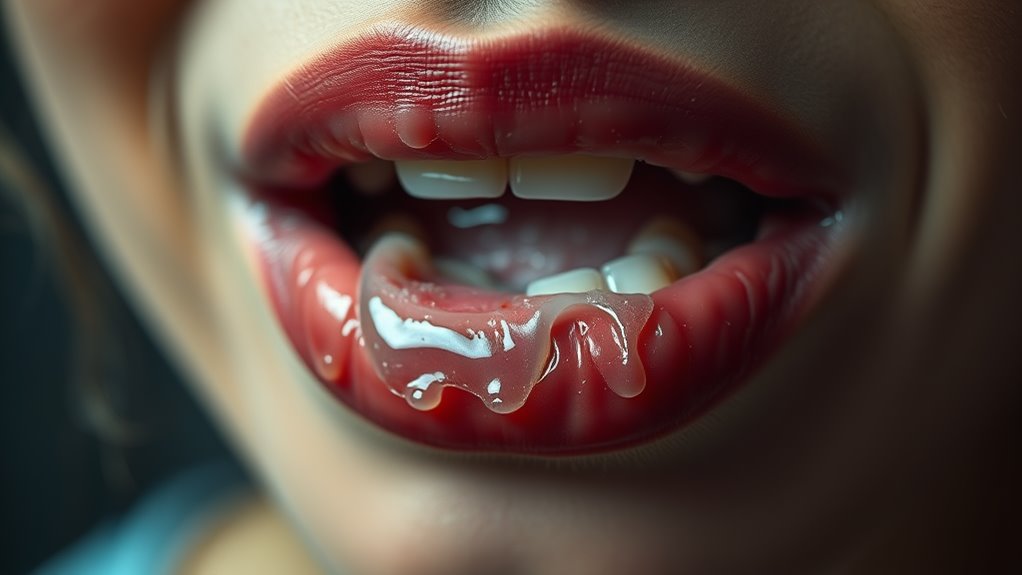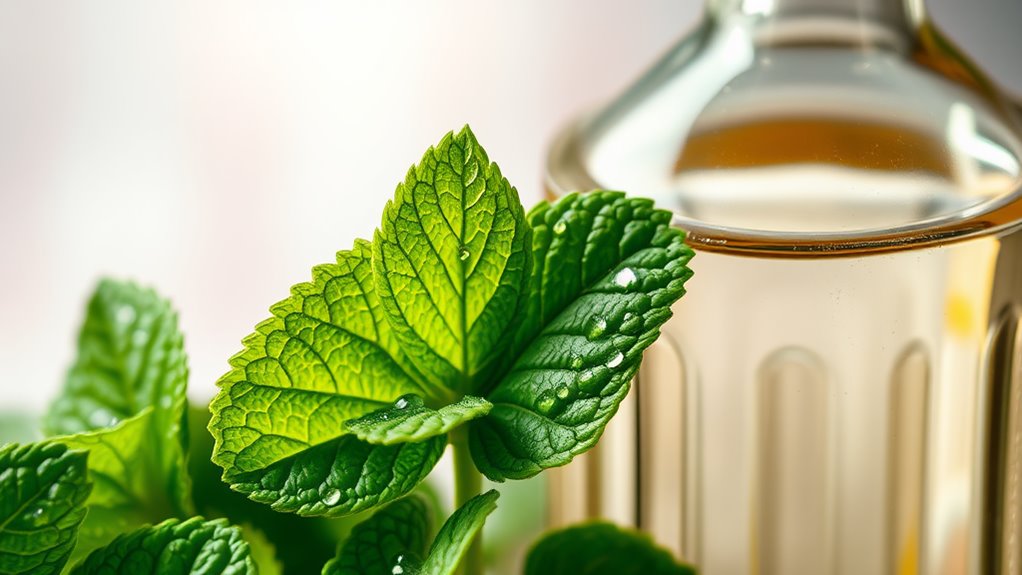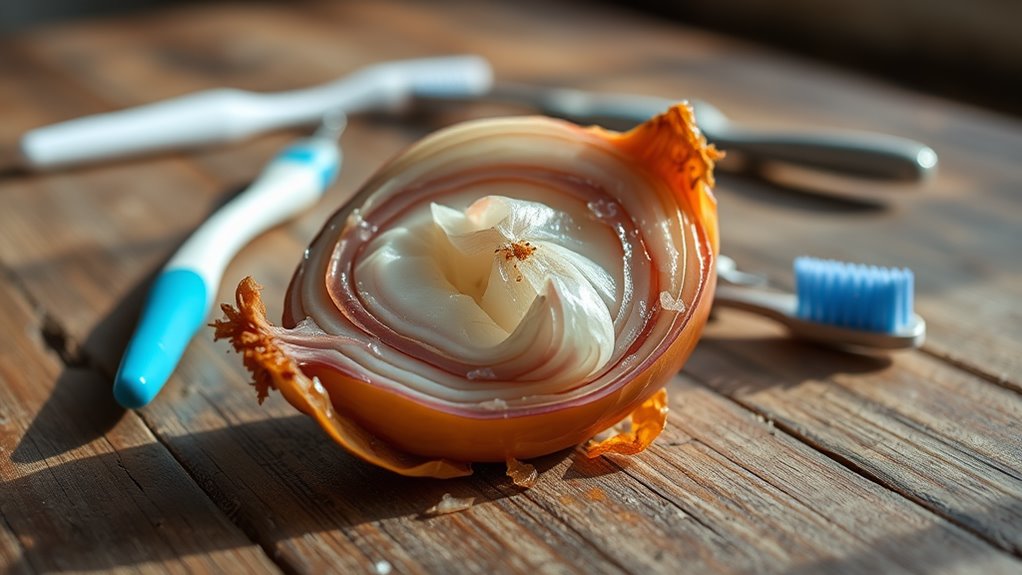Bad Breath in the Morning. Try This Before Bed
Key Takeaways
- Brush and floss your teeth before bed to eliminate food particles and plaque buildup, preventing morning bad breath.
- Stay hydrated by drinking water before sleeping to boost saliva production and minimize bad breath overnight.
- Avoid consuming strong-smelling foods like garlic and onions in the evening as they can linger and contribute to morning odor.
- Use an antibacterial mouthwash before bed to kill odor-causing bacteria and freshen your breath while you sleep.
- Consider eating yogurt at night, as its probiotics can help reduce bad breath-causing bacteria in the mouth.
Understanding Bad Breath Causes
Bad breath, or halitosis, often stems from various underlying causes that can affect anyone at any time.
Factors like dry mouth, poor dental hygiene, and certain foods contribute to unpleasant odors.
For many, a night breath solution includes drinking water before bed, avoiding tobacco, and using mouthwash.
Identifying specific triggers can help you take effective steps toward fresher breath each day. Additionally, maintaining a balanced oral care routine can support fresh breath and oral health.
Essential Oral Hygiene Practices
To maintain fresh breath, it’s vital to implement essential oral hygiene practices.
You should brush your teeth before sleeping, floss daily, and consider using mouthwash for added benefits. Incorporating tongue cleaning into your routine can significantly enhance freshness and reduce bad breath.
These simple steps can greatly reduce the risk of bad breath and improve your overall oral health.
Brush Before Sleeping
While you may feel tempted to skip brushing your teeth at night, maintaining this essential oral hygiene practice is crucial for fresh breath and overall dental health.
Brushing before bed removes plaque, food particles, and bacteria that accumulate throughout the day. It helps prevent cavities and gum disease, ensuring you wake up with a cleaner mouth and less chance of bad breath.
Don’t neglect this important step!
Floss Daily Importance
Brushing your teeth is just one piece of the puzzle when it comes to maintaining fresh breath and overall oral hygiene.
Flossing daily is essential because it:
- Removes food particles stuck between teeth.
- Helps prevent gum disease by cleaning below the gumline.
- Reduces bad breath caused by bacteria buildup.
Incorporating flossing into your routine can greatly improve your oral health.
Mouthwash Benefits Explained
Although many people think brushing and flossing are enough for oral hygiene, using mouthwash can greatly enhance your routine.
Mouthwash helps kill bacteria, reduces plaque, and freshens breath. It can reach areas where your toothbrush might miss, providing a more thorough clean.
Opt for an alcohol-free formula to prevent dryness, ensuring you maintain ideal oral health and fight bad breath effectively.
Choosing the Right Toothpaste and Mouthwash
Choosing the right toothpaste and mouthwash can greatly impact your oral health and help combat bad breath effectively.
Consider these factors:
-
Fluoride Content: Look for fluoride toothpaste to strengthen enamel.
-
Whitening Properties: If needed, choose products with gentle whitening ingredients.
-
Mouthwash Type: Opt for antibacterial mouthwash to kill odor-causing bacteria. Additionally, be cautious of overusing mouthwash, as it can disrupt the oral microbiome and potentially worsen breath.
The Role of Hydration
Maintaining proper hydration is fundamental to your oral health and can greatly influence the presence of bad breath.
When you’re dehydrated, your mouth produces less saliva, which is essential for washing away food particles and bacteria.
Make it a habit to drink enough water throughout the day, especially before bed, to help minimize bad breath and promote a healthier mouth. Additionally, regular oral hygiene practices are essential to prevent odor and ensure fresh breath.
Dietary Considerations Before Bedtime
As you wind down for the evening, the foods you choose to eat can greatly impact your breath by morning.
Consider these dietary tips before bed:
-
Avoid garlic and onions – They leave strong odors that linger.
-
Limit sugary snacks – Sugar fosters bacteria growth.
-
Choose yogurt – It contains probiotics that can help reduce bad breath.
In addition, staying hydrated with alkaline-rich water can help reduce volatile sulfur compounds, leading to fresher mornings.
Natural Remedies for Fresh Breath
Staying hydrated before sleep can help prevent dry mouth, while herbal mouth rinses can effectively combat odor. Additionally, practicing the clean tongue technique can remove bacteria and food particles, leaving your mouth feeling fresh. Furthermore, consider incorporating oil pulling into your nightly routine, as it creates a lipid barrier that traps bacteria and toxins contributing to bad breath.
Hydration Before Sleep
Staying hydrated before sleep can be a simple yet effective way to combat bad breath.
Consider these tips:
- Drink a glass of water an hour before bedtime.
- Opt for herbal teas, like chamomile, which can soothe and hydrate.
- Avoid caffeine and alcohol, as they can dry your mouth.
Herbal Mouth Rinses
Looking for a natural way to freshen your breath? Herbal mouth rinses can be an effective solution.
Ingredients like peppermint, sage, and green tea possess antibacterial properties that combat bad breath. Simply steep herbal leaves or use essential oils mixed with water, swish for 30 seconds, and spit out.
Incorporating these rinses into your nightly routine helps maintain a pleasant breath while you sleep.
Clean Tongue Technique
After using herbal mouth rinses, consider the Clean Tongue Technique for an even fresher breath.
Here’s how to effectively clean your tongue:
- Use a Tongue Scraper: Gently scrape from back to front to remove buildup.
- Rinse Thoroughly: Use water or mouthwash to wash away debris.
- Regular Practice: Incorporate this technique into your nightly routine for consistent results.




